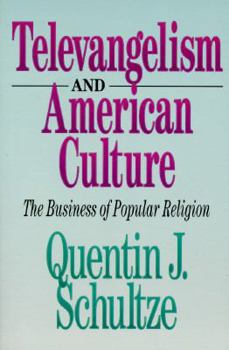Televangelism and American Culture
Select Format
Select Condition 
Book Overview
Not just another trashing of televangelism. . . . Schultze's sensitive critique of present patterns of religious programming is meant to promote a more responsible Christian use of the television... This description may be from another edition of this product.
Format:Paperback
Language:English
ISBN:080105303X
ISBN13:9780801053030
Release Date:January 1995
Publisher:Baker Publishing Group (MI)
Length:264 Pages
Weight:0.95 lbs.
Dimensions:1.0" x 6.0" x 8.9"
Age Range:15 years and up
Grade Range:Grade 10
Customer Reviews
1 rating
Televangelism
Published by Thriftbooks.com User , 15 years ago
Most of us know, if only on a tacit level, that television has transformed our world's cultural landscape. Yet few of us seriously probe its workings and implications for the church as well as for the broader society. Quentin J. Schultze, in Televangelism and American Culture: the Business of Popular Religion (Grand Rapids: Baker Book House, c. 1991) helps us do so. One of the authors of Dancing in the Dark, Schultze teaches communications at Calvin College and is a highly regarded scholar who's devoted much care to the study of television. He not only watches the programs, he studies the flood of solicitations sent to those who respond to the televangelists' appeals. What concerns Schultze is "how and why televangelists are helping to transform American Chris¬tianity from a church into a business, from a historic faith into a popular religion based at least in part on superstition" (p. 11). Still more, he argues that "televangelism is probably the most characteristic and remunerative expression of American religion. It is the nation's own religion, a special Protestant hybrid raised in American culture and nurtured by the mass media. Televangelism may even be the flagship of American religion, setting the style and tone of local and denominational life" (pp. 11-12). TV "ministries" almost always share certain traits. They are "audience-supported" --since funds come viewers' contributions the ministries must cultivate and maintain a loyal audience, so the message is tailored to please those who watch. You can easily shift channels. You write checks only when you're happy with the presentation. Keeping the audience happy, maintaining its allegiance, becomes a preeminent concern. They are "personality-led"--we want "stars" and "celebrities" in religion as much as in ath¬letics and films, so successful TV preachers and singers must be attractive personalities. It helps if they're good looking. (Knowing I planned to visit Lloyd John Ogilve's church in Hollywood, a lady who works with my wife asked me to see if he's really as handsome as he looks on TV. Well, I've seen him . . . and he is!) They are "experientially-validated"--few doctrines or historical traditions receive much attention, but practical, how-to-do-it-and-enjoy-it messages abound. The audience, of course, likely includes folks from aa variety of theological persuasions, so you must not risk alienating any of them. Even moral stances may be muted. (One study found a direct correlation between TV viewing and knowledge of the 10 Commandments--the more religious TV watched, the fewer of the commandments were known!) "Technologically sophisticated," TV ministries rival the best, state-of-the-art equipment and production techniques of their secular counterparts. They are "entertainment-oriented"--to keep folks' attention you must use variety show or talk show formats and imitate the Johnny Carsons who score with the American public. Not many Lloyd Joh





